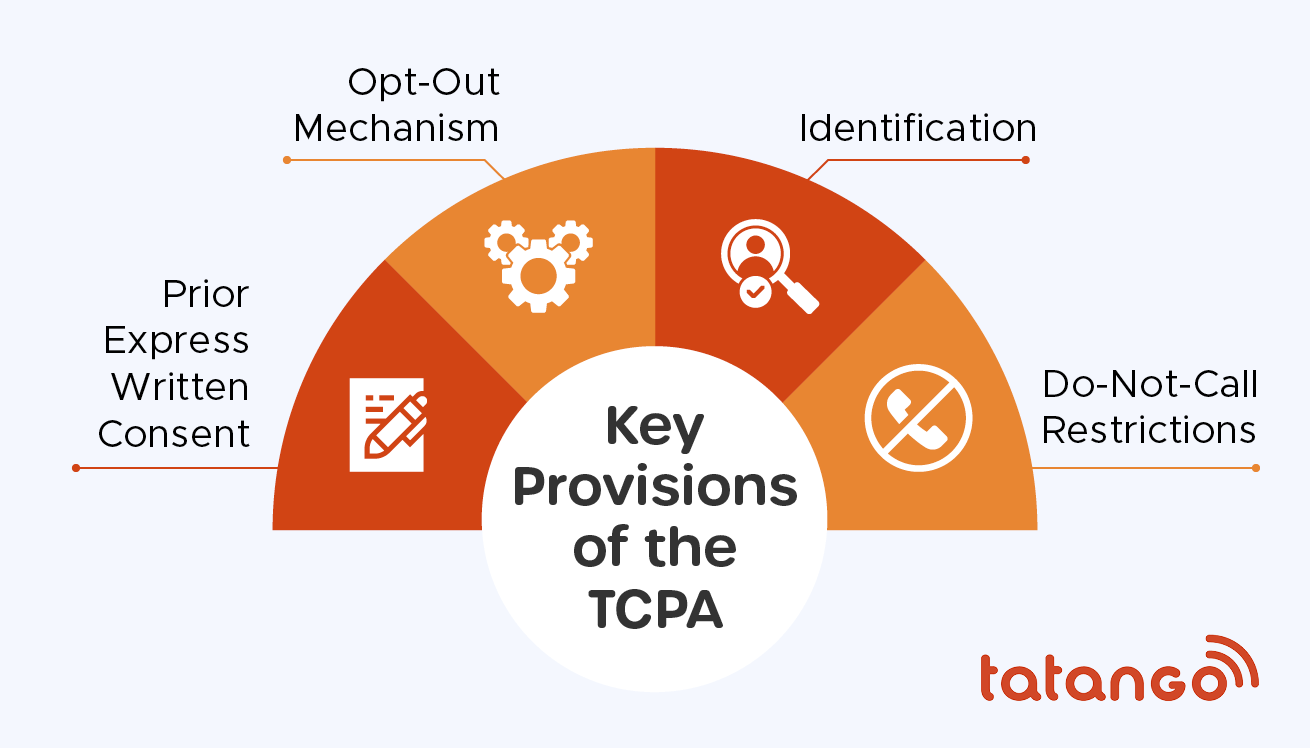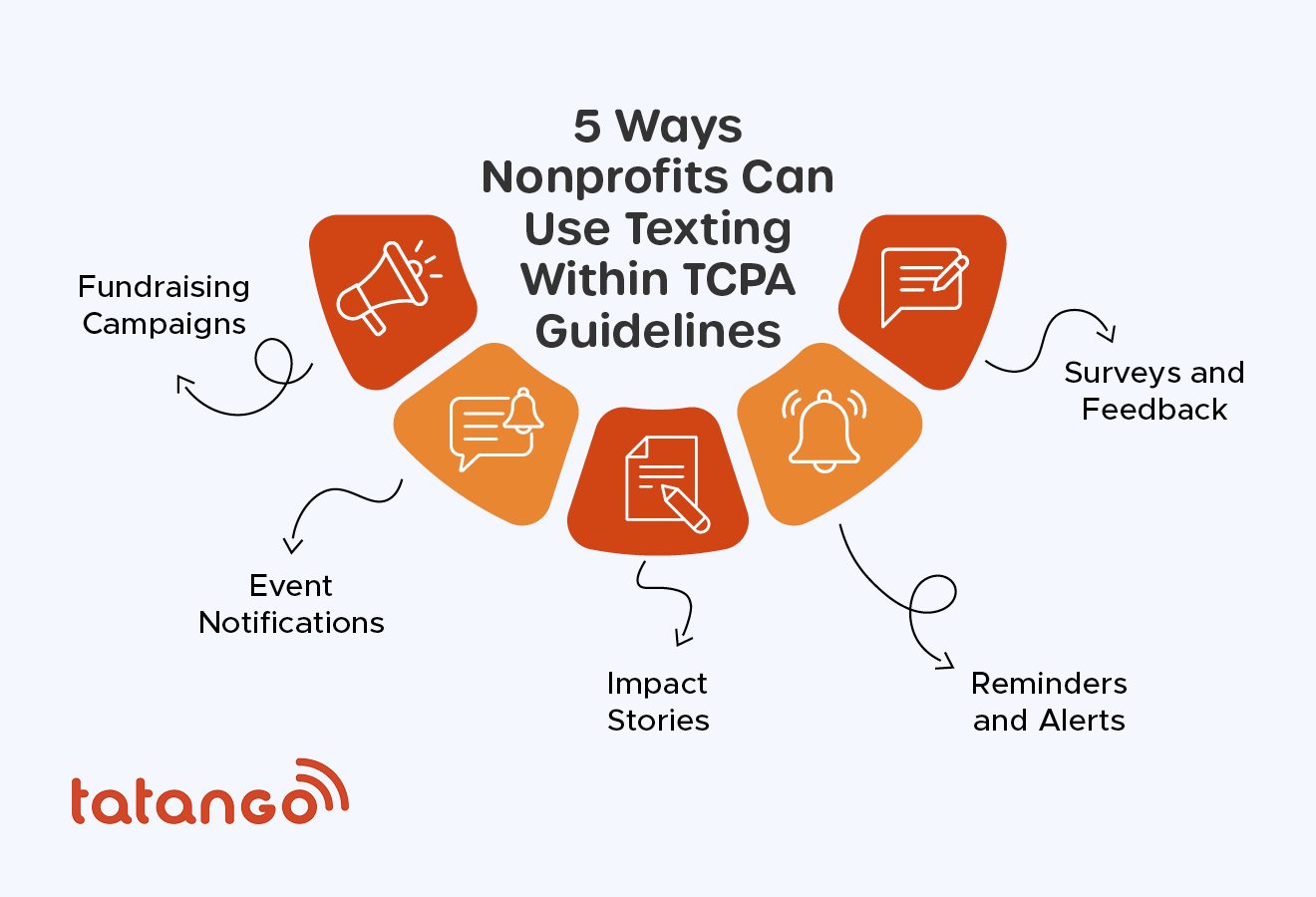Nov 11, 2025
Texting has become a powerful tool for nonprofits to directly engage with their supporters, raise funds, and amplify their missions. To leverage texting effectively and legally, nonprofits must adhere to the Telephone Consumer Protection Act (TCPA) regulations.
While nonprofits have some flexibility under the TCPA, it’s crucial to understand the nuances to avoid issues or legal ramifications. This blog post will explain what TCPA compliance is, how it works, and how nonprofits can ensure they are using texting correctly. Here’s what we’ll cover:
What is the TCPA?
The Telephone Consumer Protection Act (TCPA) is a federal law enacted in 1991 to protect consumers from unwanted and intrusive telemarketing calls, texts, and other communications, such as faxes.
The TCPA sets strict guidelines on how organizations, including nonprofits, can communicate with individuals via phone and text messages. Noncompliance with TCPA regulations can result in significant fines and legal issues, making it crucial for nonprofits to understand and adhere to these regulations.
Key Provisions of the TCPA
The TCPA governs telecommunications with these primary provisions:

- Prior Express Written Consent: Before sending any text messages, organizations must obtain consent from recipients. The TCPA generally mandates prior express written consent for telemarketing-oriented prerecorded messages to phone numbers, including residential, mobile, and VoIP services. These calls must identify the organization at the beginning, provide a contact number, and offer an automated opt-out mechanism.
- Opt-Out Mechanism: Text messages must include a clear and easy way for recipients to opt out of future communications. Many compliant organizations use “STOP” or “STOP2END.”
- Identification: Text messages must clearly identify the sender and provide contact information. Sender identification can be done either within the message content or through an automated contact card after opt-in. This ensures transparency and builds trust with recipients.
- Do-Not-Call Restrictions: The TCPA prohibits organizations from contacting people on the National Do Not Call Registry for telemarketing purposes. Additionally, organizations cannot make calls for telemarketing purposes without a policy on maintaining their own lists of people who request not to receive calls.
While not explicitly stated in the TCPA, it’s also good practice to send text messages only during reasonable hours in the recipient’s time zone to avoid being disruptive.
Areas of TCPA Nonprofit Exemption
Nonprofits are exempt from some provisions of TCPA. Let’s walk through each provision again, highlighting any TCPA nonprofit exemptions:
- Prior Express Written Consent: Partially Exempt
- Tax-exempt nonprofits are partially exempt from this provision. Since nonprofits don’t typically call for commercial purposes, they do not need express written consent for prerecorded telemarketing calls to residential lines. For mobile or charge-incurring services (like VoIP), only express consent is needed. However, it’s still best practice to obtain prior express written consent whenever possible.
- Opt-Out Mechanism: Not Exempt
- Nonprofits must always provide opt-out mechanisms for texts and prerecorded calls.
- Identification: Not Exempt
- Nonprofits still must identify themselves and provide contact information when contacting people via call or text.
- Do-Not-Call Restrictions: Exempt
- As long as nonprofits are reaching out for a solely charitable purpose, they are technically exempt from do-not-call restrictions.
While nonprofits have more flexibility than for-profit businesses regarding consent when sending informational texts or calls, it’s crucial to consult with legal counsel to fully understand the specific exemptions and ensure your practices are compliant.
How Nonprofits Can Maintain TCPA Compliance
To comply with the TCPA, nonprofits must implement several best practices in their texting campaigns:

- Obtain Clear Consent: Implement a robust process for obtaining and recording consent from individuals who wish to receive text messages. You may collect consent through online forms, text-to-join campaigns with a shortcode, or other written agreements.
- Use Double Opt-In: Though not a strict TCPA regulation, implementing a double opt-in process is a best practice that adds an extra layer of protection. After individuals sign up, send a confirmation message requiring them to reply with a keyword (like “YES”) to confirm their subscription.
- Provide Opt-Out Instructions: Every message should include instructions on how to opt out, such as replying with “STOP” to unsubscribe. Ensure that opt-out requests are processed immediately.
- Maintain Records: Keep detailed records of all consents, opt-in confirmations, and opt-out requests. This documentation can be crucial in case of legal disputes and ensures you respect constituents’ preferences.
- Conduct Regular Compliance Audits: Conduct regular audits of your texting practices to ensure ongoing compliance with TCPA regulations. Review message content, consent records, and opt-out processes.
5 Ways Nonprofits Can Use Texting Within TCPA Guidelines
Nonprofits can leverage texting in a variety of ways while staying compliant with TCPA regulations:

- Fundraising Campaigns: Send text messages to supporters with donation requests, including a direct link to donate online.
- Event Notifications: Keep your community informed about upcoming events, volunteer opportunities, and important updates.
- Impact Stories: Share success stories and testimonials from beneficiaries to inspire and motivate your supporters.
- Reminders and Alerts: Send reminders for events, meetings, and important deadlines to ensure maximum participation.
- Surveys and Feedback: Engage your audience by sending surveys and requesting feedback to improve your programs and services.
Combine these message types within your strategy to engage your supporters in different ways. For inspiration on how to construct your strategy, check out our work with the Armed Services YMCA.
Launch TCPA-Compliant SMS Campaigns with Tatango
When used responsibly, texting can be a powerful tool for nonprofits to connect with their supporters. By understanding and adhering to TCPA regulations, nonprofits can protect themselves from legal risks while building trust and engagement with their audiences. Implement these best practices to ensure your SMS campaigns are compliant, effective, and appreciated by your supporters.
Additionally, work with a partner (like Tatango!) that understands the nuances of TCPA regulations and will help you stay compliant. Tatango is an opt-in sender, and we require that organizations comply with the TPCA to send messages on our platform. Contact the team at Tatango today to learn how texting can drive revenue for your nonprofit.
To learn more about running an SMS campaign, check out these additional resources:





















